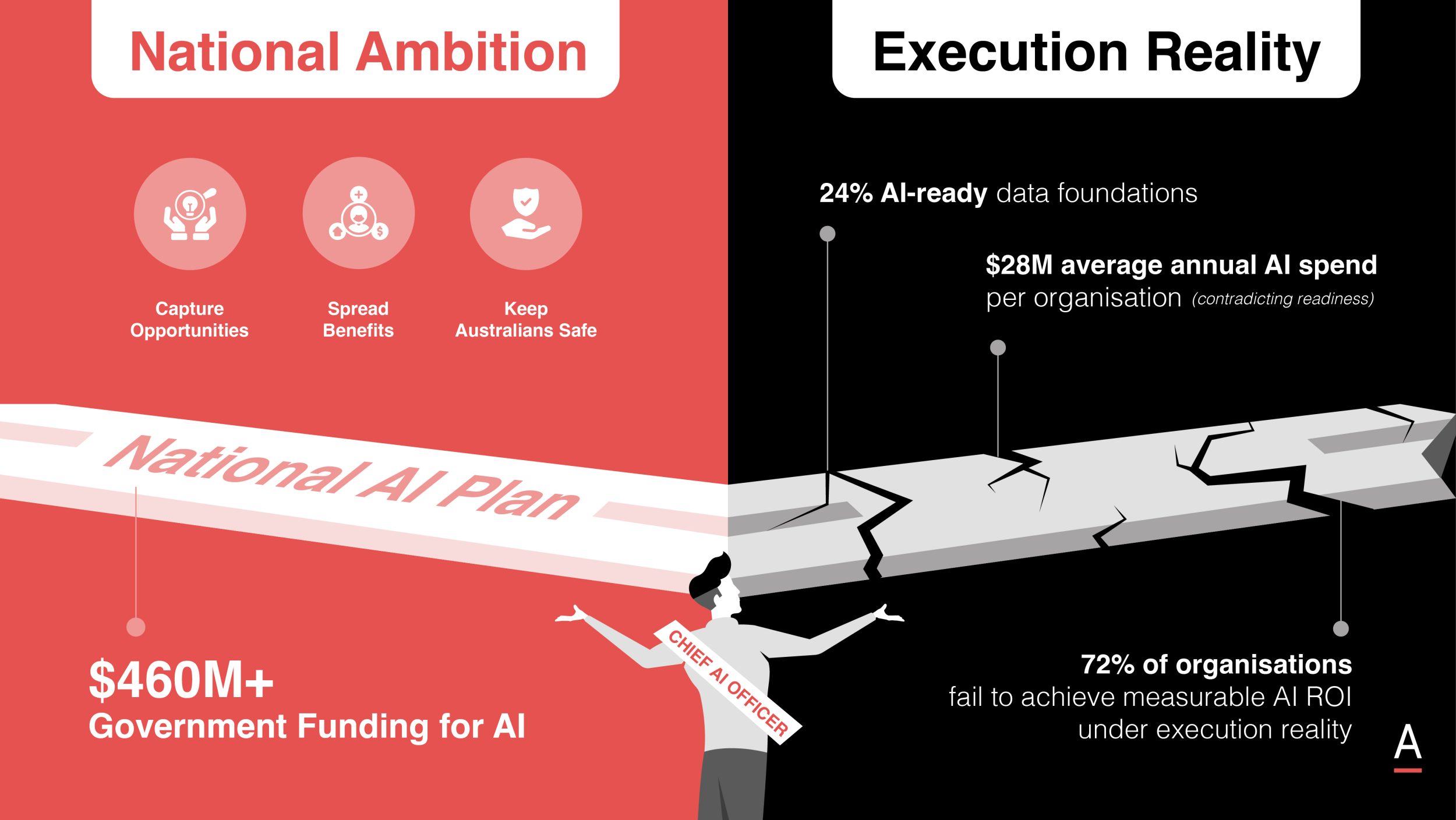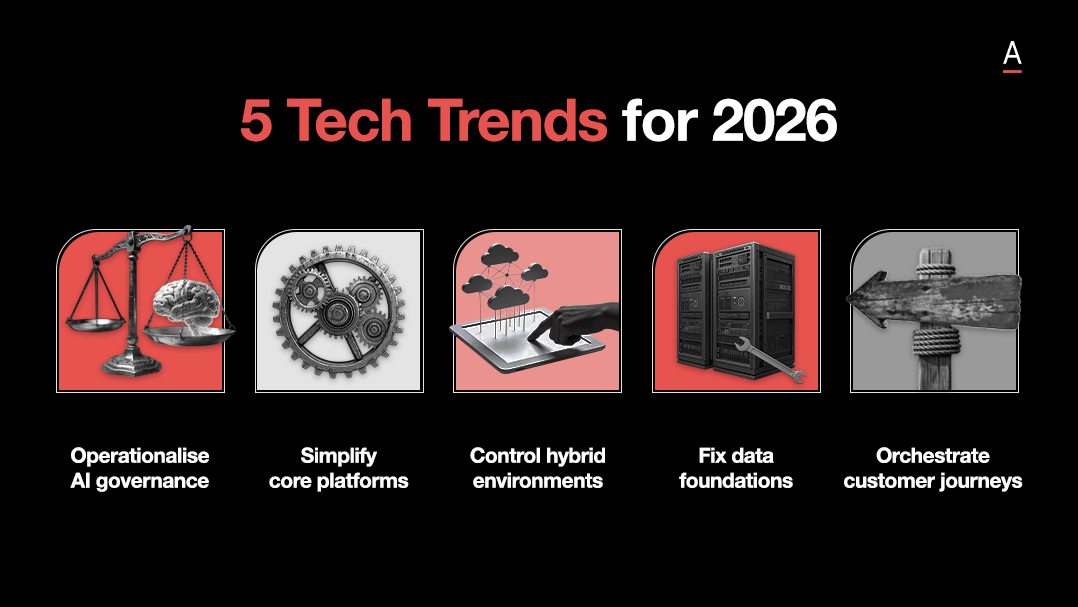Australia’s State of AI, according to 160 Data Leaders
Explore Australia's AI and data strategies from the 2024 Data & AI Edge conference, focusing on governance, leadership, and future trends.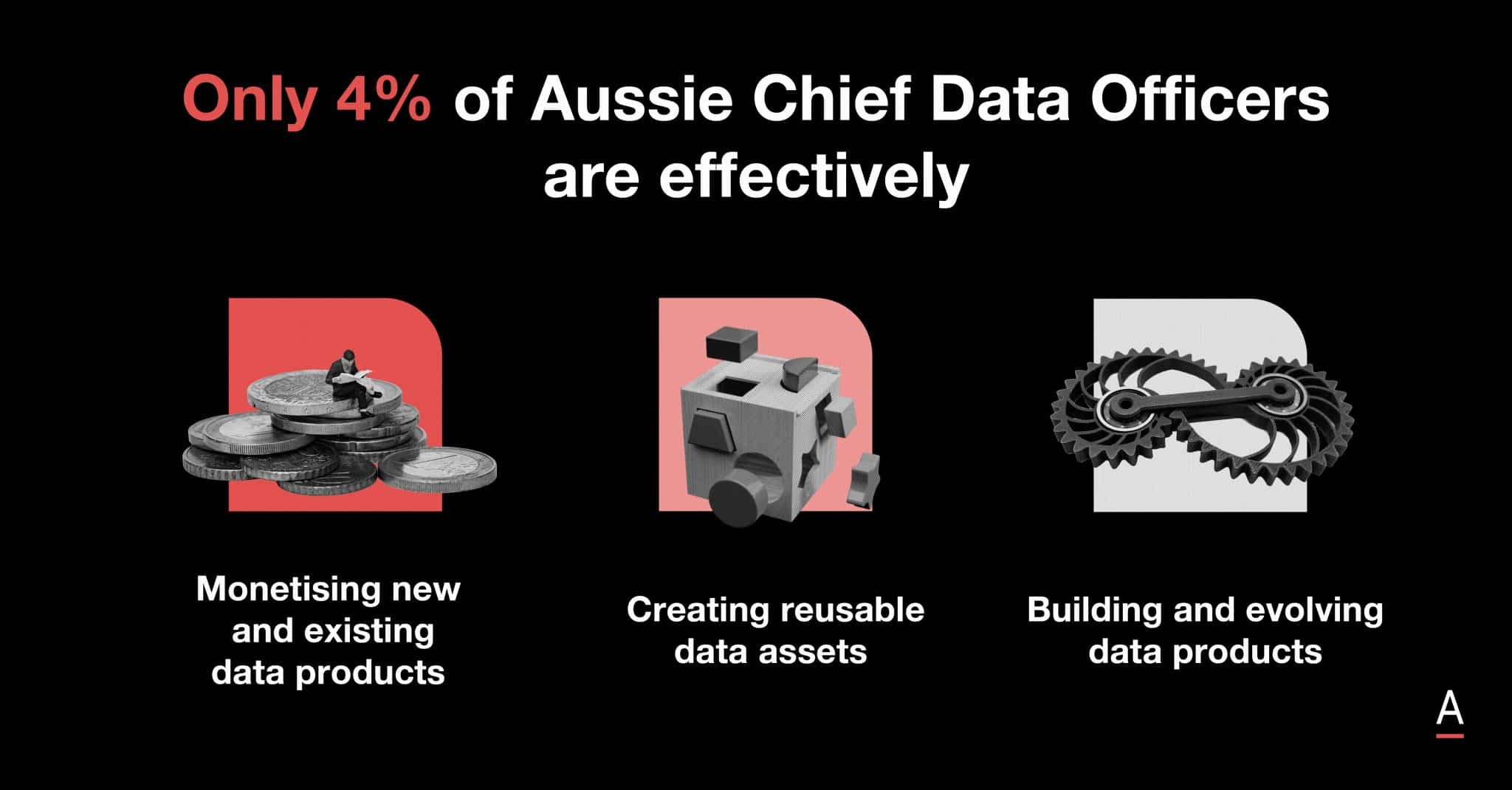
Achieving competitive advantage through an integrated data strategy, fostering a unified data culture, and mastering emerging AI are aspirations shared across Australian businesses.
However, turning this vision into reality is hampered by poor data culture, information architecture, and governance.
Aussie data leaders who attended ADAPT’s Data & AI Edge brought together over 160 data leaders from across Australia, who represent 42% of Australia’s GDP and 11% of the workforce.
We’ve asked: how prepared are we for the AI tidal wave? What’s the state of our data strategy? Will we surf this wave or sink?
Boosting CDAO Involvement to Enhance AI and Data Analytics Strategy in Australia
Insights from the latest ADAPT surveys are shining a light on critical focus areas, painting a detailed picture of how businesses are tackling both challenges and opportunities in the tech world.
Australian CIOs are prioritising cyber security, the drive towards modernisation, and the push for data-driven initiatives.
Expanding CDO Roles to Strengthen Data-Driven Architectures in AI and Data Analytics
Dr. Shivaji Dasgupta, with extensive experience as a Chief Data and Intelligence Officer across multiple large European banks, discussed the need for Chief Data Officers to expand their roles beyond traditional boundaries.
He advocates for CDOs also to take on responsibilities typically associated with Chief Information Officers (CIOs) and Chief Product Officers (CPOs).
According to Dr. Dagupta, this convergence is essential for developing robust, data-driven architectures that fully leverage AI technologies.
“By anticipating future skills and technologies, CDOs can help their organisations overcome traditional data management challenges and harness the full potential of AI.”

This perspective highlights a strategic shift where data leadership must integrate more deeply into organisations’ operational and strategic fabric, ensuring that data initiatives drive business value.
Identifying Gaps in AI Strategy Execution Among Australian CDAOs
ADAPT’s Data & AI Edge survey revealed a gap in AI strategy execution within Australian organisations.
Only 25% of CDAOs believe their organisations can internally build and train AI models. Additionally, one in three CDAOs report having little to no influence on their organisation’s AI strategy.
This misalignment is a barrier to effective AI adoption.
The survey uncovered that a stronger CDAO involvement is essential for organisations to harness AI technologies effectively.
The lack of CDAO influence suggests that many organisations may need to fully leverage their data assets or integrate AI into their strategic planning, potentially missing out on critical efficiency and innovation opportunities.
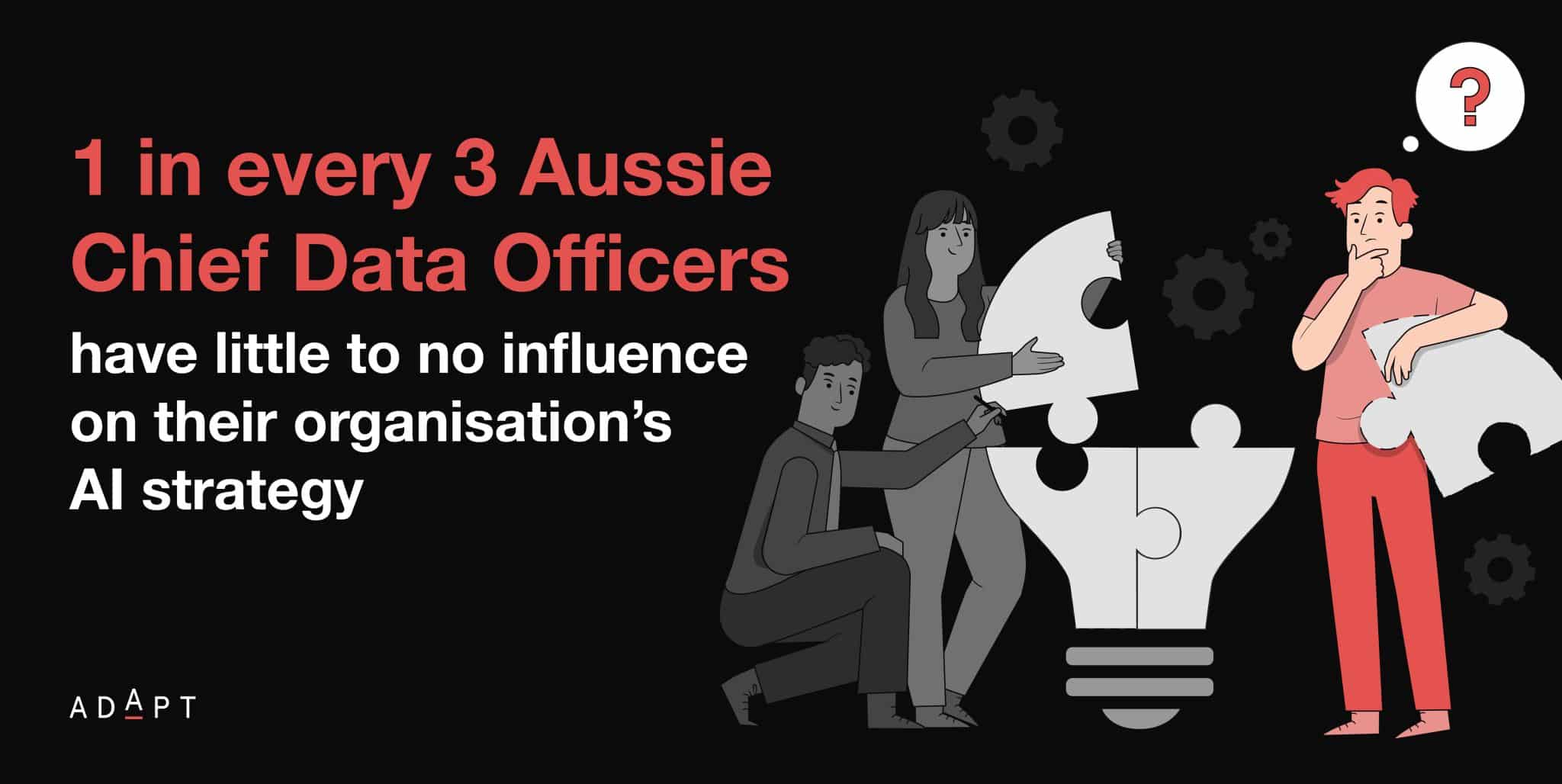
Key Takeaways:
-
Involve Chief Data & Analytics Officers (CDAOs) in high-level AI discussions and decision-making to align AI initiatives with business objectives and overcome data management challenges.
-
Promote cooperation between data, IT, and business units through regular meetings and joint projects to ensure AI initiatives are supported by robust data infrastructure and align with business goals.
-
Foster data literacy, encourage data-driven decision-making, and provide ongoing training to support CDOs and integrate data initiatives into the business strategy, driving innovation and efficiency.
Overcoming Technical Barriers to Advance AI and Data Analytics
As Australian businesses strive to leverage artificial intelligence for competitive advantage, they encounter several technical barriers.
Addressing these challenges requires an integrated approach that combines emerging technologies, robust data platforms, and an AI-embracing culture.
Insights from industry leaders provide valuable strategies to navigate these complexities.
Leveraging Quantum Computing to Enhance AI Capabilities in Australia
Claudine Ogilvie, CEO at HivePix, discussed the transformative potential of quantum computing in advancing AI capabilities.
While generative AI has made strides, its progress is often constrained by the limitations of classical computing.
Quantum computing offers a promising solution because it can manage vast amounts of data and solve complex problems rapidly.
Claudine explained, “Quantum computing can greatly enhance AI capabilities by leveraging qubits for superposition and entanglement, which facilitate the rapid resolution of complex problems.”
However, she also acknowledged the current challenges in scaling quantum computers, such as issues with decoherence and the need for extensive cryogenic infrastructure.

Integrating Data Intelligence Platforms for Seamless AI and Data Analytics
Adam Beavis, VP & Country Manager at Databricks ANZ, tackled the evolution of data technologies and introduced the concept of a data intelligence platform.
He said, “A data intelligence platform, integrated with AI capabilities, promises unified data management, simplified querying, and robust AI model deployment and governance.”
This approach highlighted the extent of developing platforms that support seamless AI integration, enhancing both the accessibility and manageability of data.
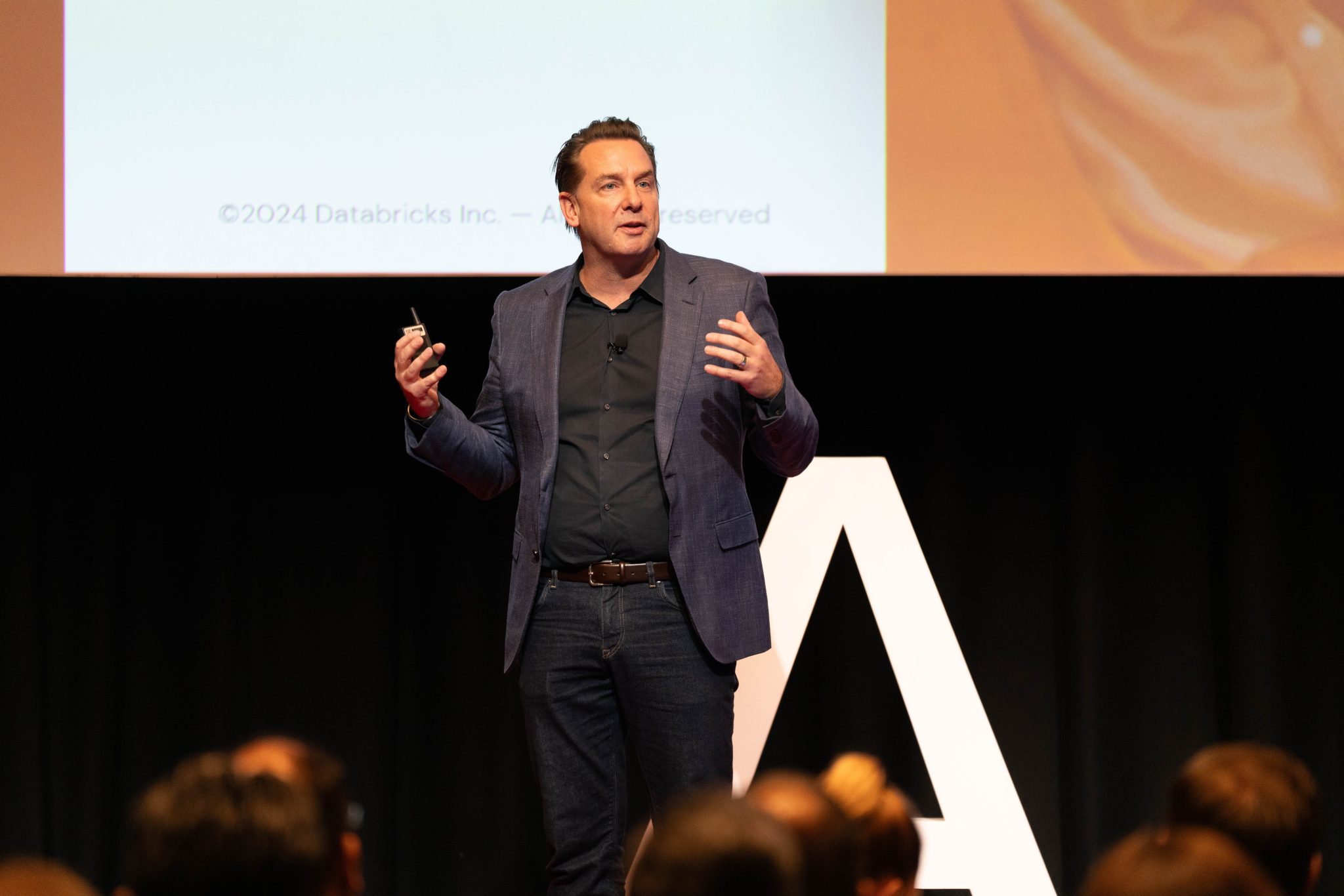
Addressing Technical Challenges in Building Successful AI Applications
Alois Reitbauer, Chief Technology Strategist at Dynatrace, delved into the technical aspects of building successful AI applications.
He discussed the value of predictive AI, causal AI, and generative AI in creating effective systems.
Alois explained, “Building successful AI applications requires addressing challenges such as data quality management, ensuring accurate outputs, and planning for resource constraints.”
His insights emphasised the necessity of a solid technical foundation to support AI initiatives, ensuring that organisations can fully exploit their AI capabilities.

Enhancing Education with AI at UTS
Higher education faces numerous challenges, and leveraging AI can be a game-changer.
During an interview at Data & AI Edge, Susan Gibson, Head of Data Analytics and AI at the University of Technology Sydney, shared insights on how AI transforms the university landscape.
Susan highlighted AI’s critical role in addressing student needs, especially with rising living costs and the demand for flexible learning solutions.
By providing 24-hour support and predictive insights, UTS aims to offer a seamless and supportive environment for students.

Innovation at UTS is driven by cross-functional “tiger teams,” which tackle AI-related challenges.
These teams, trained in AI applications, drive creative solutions and innovation across the institution.
A robust policy framework guides the implementation of AI at UTS to ensure ethical use and minimise risks.
Susan explained that their AI policy, based on the New South Wales AI Assurance Framework, addresses potential biases and ethical considerations, builds trust, and aligns with the university’s values and commitment to student welfare.
Leveraging Data for Energy Transformation at SA Power Networks
Matthew Pritchard, Head of IT Strategy at SA Power Networks, shared insights on the role of data and AI in the evolving energy sector.
Matthew talked about the dramatic shifts in the electricity industry driven by renewable energy adoption, fundamentally altering energy flow through the grid.
He stressed redesigning technology to ensure safety, quality, and reliability.

Data is central to this transformation, enabling precise asset management and optimising green energy usage.
Building a solid data culture within an organisation, especially with long-standing practices, is challenging.
Matthew explained that the first step is identifying data owners, promoting data literacy, and establishing strong data governance.
Organisations can foster a sense of ownership by involving stakeholders in these processes and, especially, improving data quality and usage.
Positioning AI and Data Analytics as Core Business Functions
AI is evolving from a mere technological support tool to a strategic enabler that drives core business processes in the contemporary business environment.
However, this transition requires a fundamental shift in how organisations perceive and implement AI.
Viewing AI as a Strategic Enabler for Business Transformation
Dr. Michael Kollo, CEO at Evolved AI, argued that AI is not just an extension of data infrastructure but a revolutionary force that can transform decision-making processes.
He explained, “AI has the potential to revolutionise cognitive processes and decision-making within organisations, driving value creation and competitive advantage.”
This view challenges the traditional notion of AI as a support function and stresses its potential to be a central component of business strategy.
By integrating AI into core business processes, organisations can unlock new levels of efficiency and innovation.
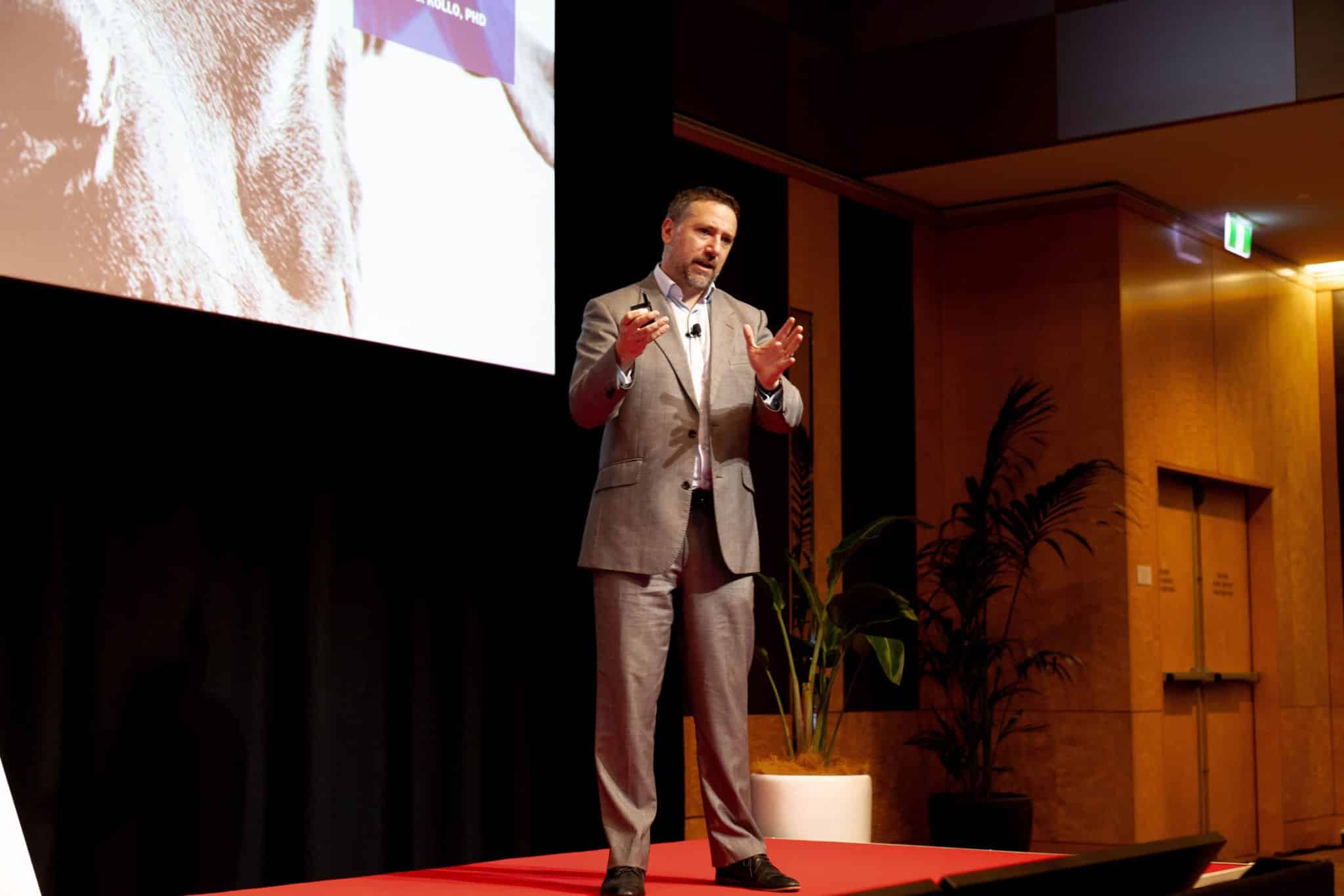
Overcoming Misconceptions and Cultural Barriers to AI Adoption
One of the hurdles in positioning AI as a core business function is overcoming the prevalent fears and misconceptions associated with AI.
Michael pointed out that many employees fear AI will replace human jobs, creating resistance to its adoption.
He clarified, “AI should be seen as a business function that augments human capabilities, not as a threat.”
AI can enhance human decision-making, improve operational efficiency, and open new opportunities.
Addressing these cultural barriers is crucial for organisations to embrace AI fully and integrate it effectively into their strategic planning.
Shifting Towards Evidence-Based Decision-Making with AI
ADAPT’s Data & AI Edge Survey revealed a shift towards evidence-based decision-making among organisational leaders.
According to the survey, there has been a 44% year-on-year increase in stakeholders relying on accurate dashboards and data insights to drive decisions.
This trend highlights the growing implication of data in organisational decision-making processes.
Michael explained, “Integrating AI into core business processes allows for more informed, data-driven decisions that can greatly enhance operational efficiency and strategic outcomes.”
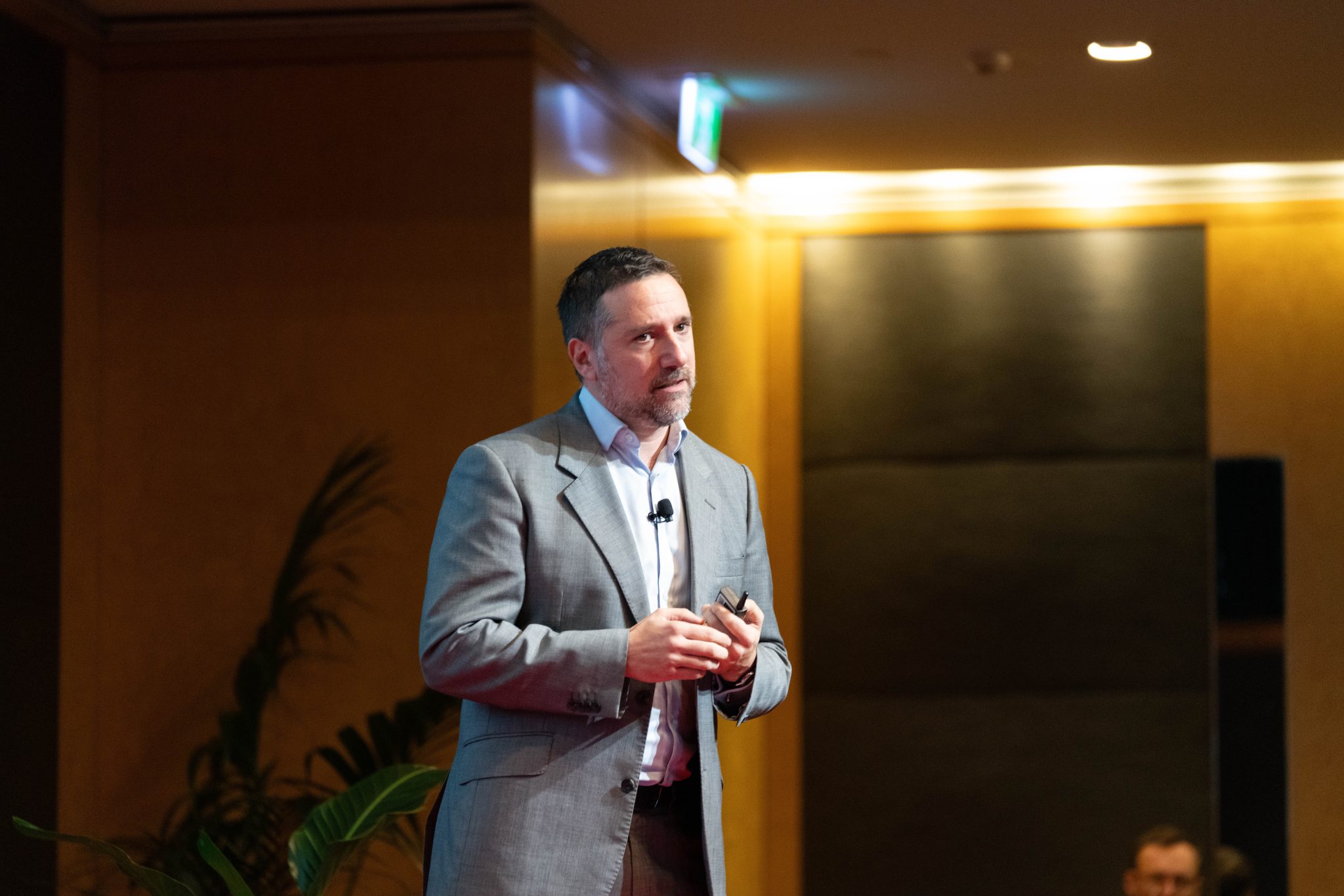
Building a Resilient Data Culture to Enhance AI and Data Analytics
To thrive in the age of AI, Australian enterprises must focus on enhancing data maturity and fostering a resilient data culture.
This involves creating an environment where data-driven decision-making is the norm and data quality and governance are prioritised.
Strengthening Data Strategy and Governance for AI Readiness
Gabby Fredkin, Head of Analytics & Insights at ADAPT, discussed the critical role of data strategy and governance in preparing organisations for AI.
According to ADAPT’s 1H Data & AI Edge Survey, organisations with robust data governance frameworks are four times more likely to be ready for AI.
Gabby explained, “Good data governance and mature data architectures enormously enhance AI preparedness and effectiveness.”
This focus on governance ensures that data is managed consistently and accurately across the organisation, providing a solid foundation for AI initiatives.
The implication of having a transparent, standardised approach to data management cannot be overstated, as it directly impacts the organisation’s ability to leverage AI technologies effectively.
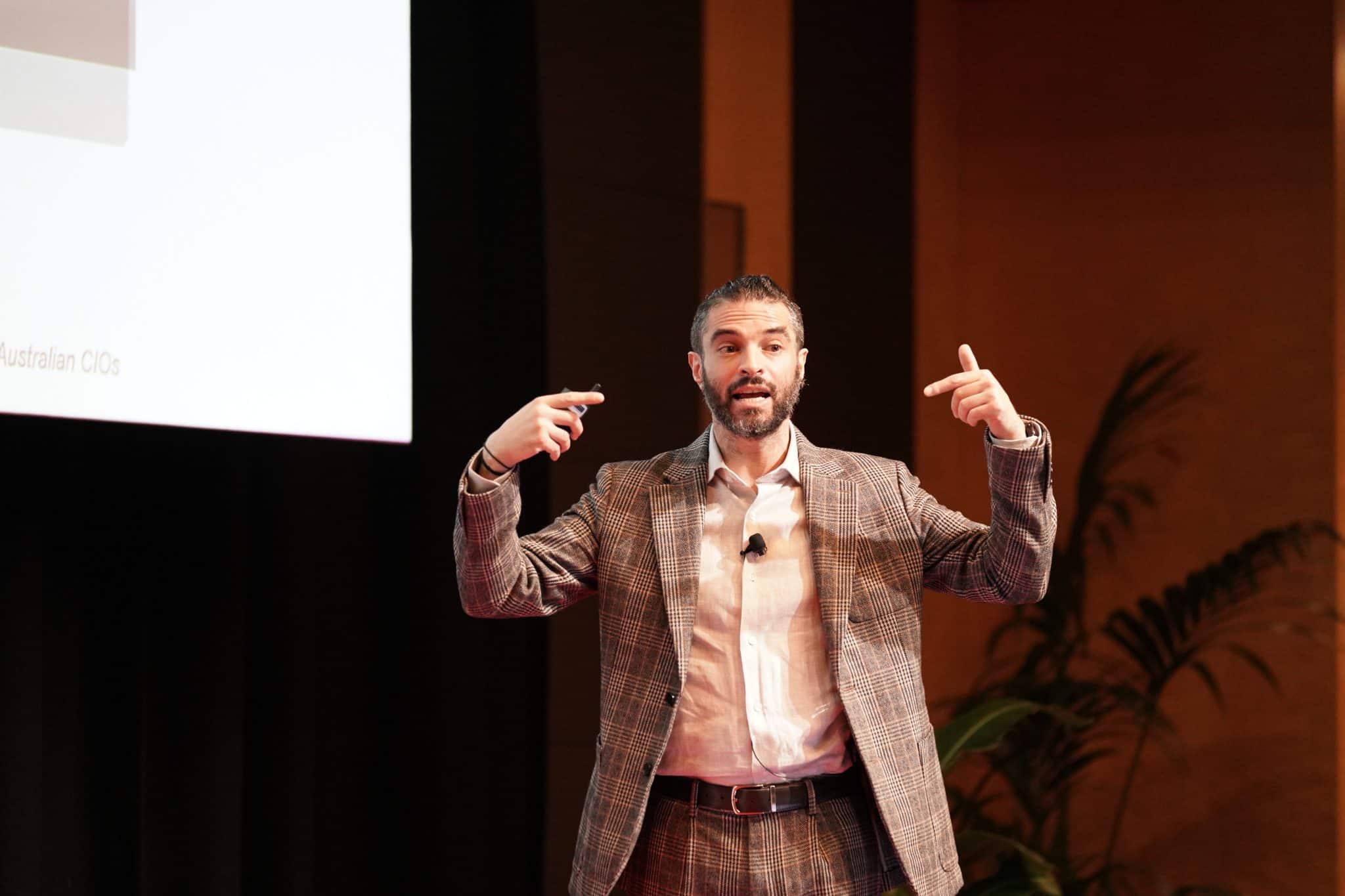
Cultivating a Data-Driven Culture and Enhancing Data Literacy
Gabby also covered the need to foster a data-driven culture and improve end-user data literacy.
The survey uncovered that organisations with a productive data culture and high levels of data literacy are nine times more likely to be prepared for AI.
Gabby encouraged proactive engagement from executive leadership to build organisational data literacy.
By promoting a culture that values data and continuous learning, organisations can ensure that their workforce is equipped to leverage AI effectively.
This cultural shift requires training and resources and a commitment from leadership to model data-centric behaviours.
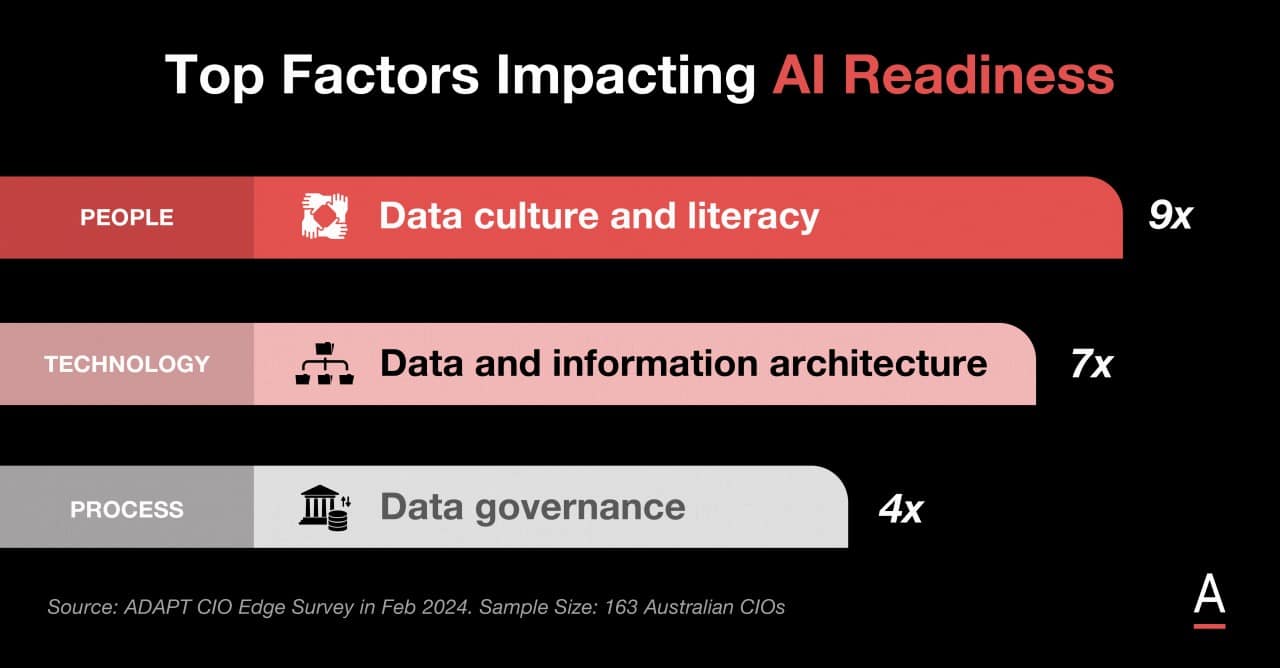
Expanding AI and Data-Driven Legal Services at Slater & Gordon Lawyers
Dhivian Govender, Head of Digital Data & Analytics at Slater & Gordon Lawyers, shared insights on transforming legal services with AI and data analytics during an interview at Data & AI Edge.
Dhivian highlighted the need for a holistic view of data to make better decisions and the need for collaboration with end users to address data quality issues.
Creating a data-driven culture within a traditional industry like law requires strategic thinking and patience.
Engaging end users, providing proof of concept, and demonstrating tangible benefits are essential in fostering a data-driven mindset.

He noted the successful implementation of machine learning models in previous roles to optimise processes and drive innovation.
Ensuring ethical data usage is non-negotiable, and Dhivian stressed the need for solid governance frameworks to protect client data and maintain trust.
Implementing robust data usage policies and capturing customer consent is crucial in balancing innovation with ethical responsibility.
By addressing these areas, Slater & Gordon Lawyers are revolutionising their services, maximising their data potential, and positioning themselves for success in the evolving legal landscape.
Enhancing Data Maturity and AI Integration in Australian Enterprises
Recent findings show a shift towards evidence-based decision-making, with confidence in data strategies rising from 48% in 2023 to 54% and reliance on evidence from 39% to 50%, indicating a 44% increase.
But to truly unlock the full potential of data, Australian businesses must prioritise mastering data maturity.
In a recent Data & AI Edge executive panel, data leaders from NAB, Telstra, and HivePix delved into the growing importance of data maturity and its link to successful AI integration.

Joanna Gurry, Executive – Data Platforms at NAB, shared that effective AI deployment requires diverse skills, including mathematicians, coders, architects, analysts, and security experts.
She highlighted the need for a team approach rather than assigning AI responsibilities to a single person.
Dayle Stevens, Executive – Data & AI at Telstra, noted AI’s role in improving employee performance through projects that enhance frontline staff efficiency.
Claudine Ogilvie, CEO at HivePix, stressed the importance of cautious, strategic AI integration, focusing on high-impact, business-led projects, and ensuring proper data quality and governance.
Key Takeaways:
-
Enhance data literacy at all levels, champion data-driven decision-making, and provide ongoing training and resources to build data skills across the workforce.
-
Allocate resources to technical infrastructure for end-to-end data management and protection of Personally Identifiable Information (PII) to maintain data integrity and compliance.
-
Ensure executive leadership is actively involved in data and AI initiatives to drive a data-centric culture and align data strategies with business objectives.
Structuring AI and Data Analytics Use Cases and Compliance
Fully harnessing AI’s potential requires well-defined AI use cases and robust compliance frameworks.
These will ensure that AI initiatives are strategically aligned with business goals and adhere to regulatory standards, mitigating risks and maximising benefits.
Defining Clear AI Use Cases to Maximise Strategic Value
ADAPT’s Data & AI Edge Survey reveals a gap in AI use case identification among Australian enterprises.
Nearly half (48%) of the surveyed Chief Data & Analytics Officers (CDAOs) report that their organisations lack well-defined AI use cases for 2024.
This absence of clear AI use cases indicates that many organisations still need to leverage AI to its full potential.
Initiatives can become fragmented and misaligned with broader, specific strategic use cases.
To address this, organisations must prioritise identifying AI applications that align with their core goals, ensuring that AI efforts are focused and effective.
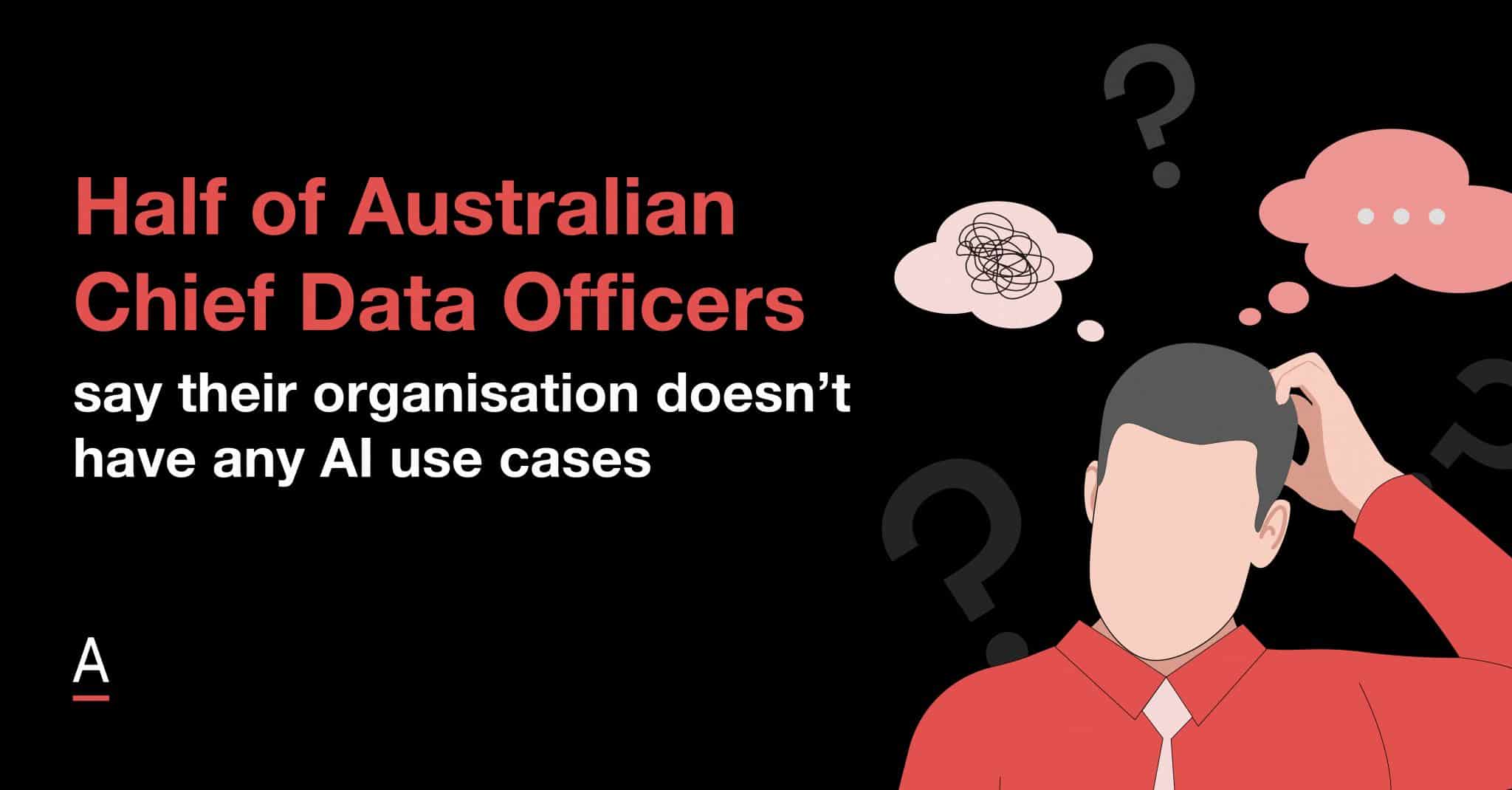
Enhancing Confidence in Managing Financial and Customer Data
While some organisations have made progress in managing certain types of data, confidence levels vary.
The survey showed that organisations generally feel more confident handling financial and customer data.
However, there is less confidence in managing environmental data, primarily due to the complexities of multiple regulatory frameworks and a lack of transparent data stewardship.
This disparity highlights the need for robust, adaptable compliance frameworks that address various data types and regulatory requirements.
ADAPT’s Gabby Fredkin noted, “Effective data stewardship and comprehensive regulatory compliance are crucial for mitigating risks associated with AI applications.”
Organisations must develop strategies that address these gaps to ensure comprehensive data management and regulatory adherence.
Building Structured Frameworks for AI Compliance
Developing structured frameworks for AI compliance ensures that AI initiatives are legally sound and ethically responsible.
These frameworks should be comprehensive, addressing diverse regulatory requirements and data types, encompassing data governance, security, and ethical considerations.
Such a framework not only ensures adherence to regulations but also enhances the trustworthiness and reliability of AI systems, helping organisations mitigate legal and reputational risks while fostering a culture of ethical AI deployment.
Implementing a comprehensive compliance framework is crucial for building trust in AI systems and ensuring their sustainable integration.
What’s the future of AI and Data Analytics in Australia?
Since the GFC, we’ve consistently done more with less, leading to underfunded technology and underappreciated technologists. Risk-averse boards hesitate to focus long-term.
With the AI tidal wave coming, articulating business value is more critical than ever. CEOs and CFOs need essential investments, not just nice-to-haves.
By refining strategies, overcoming challenges, and focusing on strategic alignment, robust governance, and continuous learning, Australian enterprises can harness the power of AI to achieve sustainable growth and success.



































